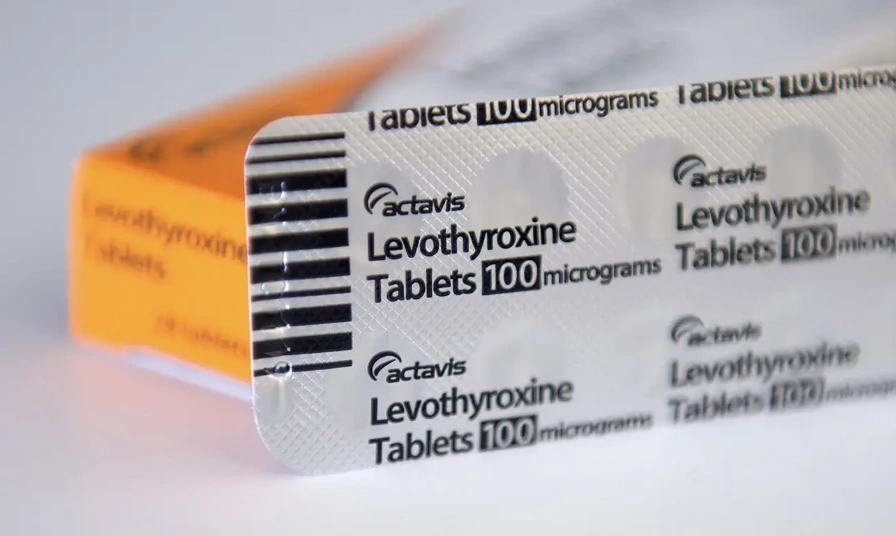
Does Levothyroxine Cause Weight Gain? Explained
Levothyroxine is one of the most commonly prescribed medications for hypothyroidism, a condition where the thyroid gland doesn’t produce enough thyroid hormones. This synthetic hormone is designed to normalize thyroid levels, helping to manage symptoms like fatigue, depression, and weight fluctuations.
However, one of the most frequently asked questions among levothyroxine users is: Does it cause weight gain? While weight regulation is a key concern for many individuals with thyroid disorders, understanding levothyroxine’s role in weight changes can help set realistic expectations.
What Is Levothyroxine?
Levothyroxine is a synthetic version of thyroxine (T4), a hormone naturally produced by the thyroid gland. It works by restoring normal levels of thyroid hormones, which are critical for regulating metabolism, energy levels, and overall bodily functions.
Prescribed for conditions such as:
- Hypothyroidism
- Goiter prevention
- Post-thyroidectomy hormone replacement
Levothyroxine aims to bring hormone levels back into balance.
How Does Hypothyroidism Affect Weight?
Hypothyroidism slows the body’s metabolism, leading to weight gain for many people. This weight gain is typically due to:
- Fluid Retention: Low thyroid hormones can cause water retention, contributing to a slight increase on the scale.
- Reduced Metabolic Rate: A sluggish metabolism burns fewer calories, causing fat accumulation even with a normal diet.
Once levothyroxine treatment begins, restoring hormone levels usually improves metabolism, often leading to modest weight loss.
Can Levothyroxine Cause Weight Gain?
Despite its intended role in correcting hypothyroidism, some users report weight gain after starting levothyroxine. However, this is generally not caused by the medication itself. Let’s examine the reasons:
1. Hormonal Adjustments
As the body adjusts to normalized hormone levels, changes in appetite, energy, and metabolism can occur. For some, increased appetite might lead to higher calorie intake, resulting in weight gain.
2. Improved Energy Levels
Once treatment begins, individuals often feel more energetic. This newfound energy may lead to lifestyle changes like increased activity, but it can also lead to overeating in some cases.
3. Inadequate Dosage
If the dosage of levothyroxine is too low, hypothyroid symptoms—including weight gain—may persist. Periodic blood tests are essential to ensure the dosage is effective.
4. Underlying Conditions
Other health issues, like insulin resistance, PCOS, or menopause, might contribute to weight gain independently of levothyroxine use.
5. Medications and Lifestyle Factors
Certain medications (e.g., antidepressants) and lifestyle factors, like poor diet or lack of exercise, can play a larger role in weight gain than levothyroxine itself.
What to Expect with Levothyroxine
For most people, levothyroxine helps stabilize weight rather than causing significant weight loss or gain. Studies suggest that individuals may lose a small amount of weight (5-10 pounds) as fluid retention decreases and metabolism improves. However, dramatic weight loss should not be expected unless paired with healthy lifestyle changes.
How to Manage Weight While on Levothyroxine
- Monitor Thyroid Levels
Regular TSH (thyroid-stimulating hormone) tests ensure your dosage is correct. If symptoms persist, consult your doctor about adjustments. - Adopt a Balanced Diet
Focus on whole foods, lean proteins, healthy fats, and fiber to support metabolism and control hunger. Avoid excessive processed foods and sugar. - Stay Active
Regular exercise—both strength training and cardio—can help regulate weight and boost energy levels. - Limit Goitrogenic Foods
Foods like kale, broccoli, and soy can interfere with thyroid function if consumed in large quantities. Cook these vegetables to minimize their effects. - Take Levothyroxine Correctly
To maximize absorption, take levothyroxine on an empty stomach, 30-60 minutes before breakfast. Avoid consuming calcium, iron, or certain medications within 4 hours of your dose.
When to Talk to Your Doctor
If you’re experiencing significant weight gain despite taking levothyroxine as prescribed, discuss your concerns with your healthcare provider. They may:
- Adjust your medication dosage.
- Test for other conditions affecting weight, like insulin resistance or adrenal issues.
- Recommend seeing a dietitian or endocrinologist for specialized care.
The Bottom Line
Levothyroxine itself does not directly cause weight gain. In fact, it often helps reduce hypothyroid-related weight by normalizing metabolism. However, weight changes can still occur due to dosage issues, lifestyle factors, or other underlying conditions.
Managing expectations, staying consistent with your medication, and adopting a healthy lifestyle can ensure that levothyroxine works effectively to support your overall well-being.







































